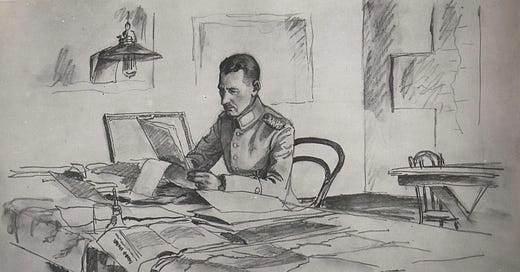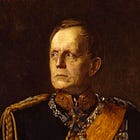In the years leading up to the First World War, an officer who wished to serve on the general staff of the Kingdom of Prussia began his quest by taking a competitive examination. In order to qualify for this test, the young officer had to have served for somewhere between seven and ten years as a subaltern in the army of Prussia, Saxony, or Württemberg.1
In 1910, 700 candidates took this examination. Of these, 160 earned a seat in the incoming class at the famous Kriegsakademie of Berlin.
While the Kriegsakademie asked much of students, nearly all of the officers admitted to that school completed the three-year course of study. Graduation, however, did not guarantee acceptance into the Prussian General Staff. Far from it, only a third or so of the officers who graduated from the Kriegsakademie in 1910 earned a secondment to the central bureau of the Prussian General Staff, the Great General Staff [Großer Generalstab] in Berlin. The rest returned to their regiments.2
The seconded [kommandiert] officers spent one, two, or three years on probation. During that time, they divided their time between the routine work of one of the component sections of the Great General Staff and the solution of the map problems.
At the end of his first year of service with the Great General Staff, a seconded officer faced a formal review of his performance. This might result in transfer to the General Staff, a return to regimental duty, or an extension of his probation for another year.
Officers who continued to serve as probationers faced a similar review at the end of each year in that status. If, however, a seconded officer spent three years with the Great General Staff without earning a permanent place in that organization, he went back to his regiment of origin.
Thanks to this continual ‘culling of the herd’, fewer than 25 of the 160 or so of officers who graduated from the Kriegsakademie each year ended up as fully-fledged members of the General Staff. Those who completed their quests, however, enjoyed the prestige associated with membership in an extraordinarily selective club, as well as the more tangible benefit of accelerated promotion.
Sources:
Anonymous ‘La Carrière de l’Officer d’État-Major Allemand’ [‘The Career of an Officer of the German General Staff’] Revue Militaire des Armées Étrangères [Military Review of Foreign Armies] (October 1910) page 328-355.
Hans Peter Menkel ‘Der deutsche Generalstabsdienst vor und während des Ersten Weltrieges’ [‘German General Staff Service before and during the First World War’] Europaische Wehrkunde [European Military Science] (September 1978) pages 464-470.
Prussia, Geheime Kriegs-Kanzlei [Privy War Chancellery] Rangliste der Königlich Preussischen Armee und des XIII. (Königlich Württembergischen) Armeekorps [List of Officers of the Royal Prussian Army and the XIII. (Royal Württemberg) Army Corps] (Berlin: E.S. Mittler, 1910) pages 15-29
Saxony, Kriegsministerium [War Ministry] Rangliste der Königlich Sächsischen Armee für das Jahr 1910 [List of Officers of the Royal Saxon Army for 1910] (Dresden: C. Heinrich, 1910) pages 6 and 7
For Further Reading:
To Share, Subscribe, or Support:
.
The Kingdom of Bavaria possessed a Kriegsakademie of its own.
An official listing of the posts held by officers of the armies of Prussia and Württemberg indicates that ten percent of the officers serving secondments with the Prussian General Staff in 1910 held commissions from the Kingdom of Württemberg. However, neither that list nor its Saxon counterpart makes any mention of the secondment of Saxon officers to the Prussian General Staff.








Interesting to note that rather than going to Harvard for an MBA during a career to become more “civilianized” so Americans would love them more, these fellows were competing to be the best military officers possible. No doubt some down sides to the regimented process but when one focuses on their career military or otherwise it amazing to see what can come of it.
May I ask, what happened to the ones that went back to their regiments?
was washing out a death sentence for a career or was it "we are happy to have your skills back here"?